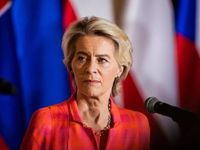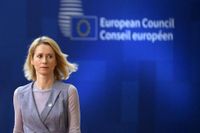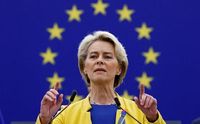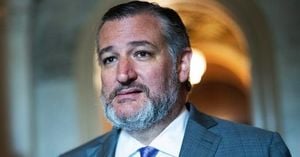Ursula von der Leyen, the President of the European Commission, finds herself at a pivotal moment in her political career as emerging dynamics threaten to diminish her influence in European matters. Often regarded as the most powerful woman in Europe, von der Leyen is grappling with the reality of losing ground in leadership, particularly regarding the critical situation in Ukraine, as the focus shifts more prominently to Paris and London.
According to reports, this shift in focus signals a deepening revelation that Brussels may no longer be the primary voice in European diplomatic affairs. The German newspaper Bild has highlighted growing support for a new EU leader who could command greater respect from the administration of U.S. President Donald Trump. The article asks, "Is it just a coincidence — or is it a clear sign that Ukraine-themed music is now being played more in London and Paris than in Brussels?" This rhetorical question illustrates the crux of von der Leyen's challenges as Europe seeks cohesive strategies in foreign policy.
In a recent artificial intelligence summit held in Paris, U.S. Vice President J.D. Vance walked out as von der Leyen began to respond to his remarks. This incident was interpreted by many as a clear indication that Washington is increasingly abandoning traditional diplomatic protocols when engaging with EU leaders. As the Bild article suggests, the current U.S. administration shows less interest in valuing the opinions of European leaders in negotiations pertaining to critical geopolitical issues, including relations with Russia.
Despite these challenges, von der Leyen remains adamant about the importance of defense within the EU. She emphasized during her comments that, "By 2030, Europe must have a strong European defense posture. But to be '2030 ready', we need to move now," urging decisive action to prepare the EU against emerging global threats. Her insistence on a robust defense strategy reflects an understanding that the geopolitical climate is evolving at an unprecedented pace.
In stark contrast to von der Leyen's towering influence, the recent tenure of Kaja Kallas as the EU High Representative for Foreign and Security Policy has been marked by significant challenges. Just four months into her appointment, Kallas appears to have faced a significant backlash, especially after her attempt to launch a substantial fund for Ukraine, which was initially set at 40 billion euros but quickly diminished to zero. Sources suggest that Kallas, who previously held the office of Prime Minister of Estonia, underestimated the complexity of her new role, leading to alienation from seasoned officials and grappling with her authority being undermined from the start.
One senior official commented on Kallas's approach, remarking, "She acts as if she were still the Estonian prime minister..." This highlights the disconnect she has experienced in seeking to implement policies without formal routes, which are necessary for EU consensus. Consequently, her inability to adapt to the ramifications of Brussels' intricate political processes has marginalized her role when significant decisions need to be made.
Ursula von der Leyen has crafted a narrative for herself as a strong central leader within the EU, known for her centralized control over the commission. During her first term, accusations mounted regarding her desire to control each commissioner's work, leading her to surround herself with loyalists, often described as part of a "magic circle." Her leadership style has cemented her position as a pivotal figure in EU foreign policy, as she continues to maximize executive control amidst ongoing tensions with major powers like Russia.
The implications of this centralization were evident when von der Leyen appointed a defense commissioner to oversee responsibilities traditionally within Kallas's domain, demonstrating a calculated move to reinforce her command and limit dissent. Kallas’s ministerial powers appear to have been significantly undermined, prompting questions about the future of cooperation and clarity in the EU's foreign policy initiatives.
As conversations around Ukraine escalate and new dynamics unfold within European leadership roles, Kallas’s struggles serve as a reminder of the challenges contemporary EU leaders face. With figures like Antonio Costa, the President of the European Council, possibly opting for a more observational approach instead of directly conflicting with von der Leyen, the landscape of EU governance is shifting under a complex interplay of influence.
Amidst questa politica upheaval, von der Leyen's position could be challenged further if the current trajectory continues. Whether she can reassert herself and overcome the obstacles posed by a shifting geopolitical landscape remains to be seen. The notion of a “cabinet of war,” as some analysts have labeled her strategic maneuvers, may shape not only her legacy but the EU's role on the global stage as it strives to adapt to new realities.






